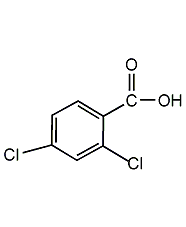
Structural formula
| Business number | 013P |
|---|---|
| Molecular formula | C7H4Cl2O2 |
| Molecular weight | 191.01 |
| label |
Cl2C6H3CO2H |
Numbering system
CAS number:50-45-3
MDL number:MFCD00002413
EINECS number:200-039-5
RTECS number:DG6475000
BRN number:1946217
PubChem number:24853491
Physical property data
1. Character: white crystal
2. Density (g/mL, 25/4℃): Undetermined
3. Relative vapor density (g/mL, air =1): Undetermined
4. Melting point (ºC): 168.3 °C (lit.)
5. Boiling point (ºC, normal pressure): Undetermined
6. Boiling point (ºC, 5.2 kPa): Not determined
7. Refractive index: Not determined
8. Flash point (ºC): Not determined
9. Specific rotation (º): Undetermined
10. Autoignition point or ignition temperature (ºC): Undetermined
11. Vapor pressure (kPa, 25 ºC): Undetermined
12. Saturated vapor pressure (kPa, 60 ºC): Undetermined
13. Heat of combustion (KJ/mol): Undetermined
14. Critical temperature (ºC): Undetermined
15. Critical pressure (KPa): Undetermined
16. Log value of oil-water (octanol/water) partition coefficient : Undetermined
17. Explosion upper limit (%, V/V): Undetermined
18. Explosion lower limit (%, V/V): Undetermined
19. Solubility: Slightly soluble in water
Toxicological data
1. Acute toxicity: mouse subcutaneous LD50: 900mg/kg
Ecological data
None
Molecular structure data
1. Molar refractive index: 42.97
2. Molar volume (cm3/mol): 125.8
3. Isotonic specific volume (90.2K ): 341.1
4. Surface tension (dyne/cm): 53.9
5. Polarizability (10-24cm3): 17.03
Compute chemical data
1. Hydrophobic parameter calculation reference value (XlogP): 2.7
2. Number of hydrogen bond donors: 1
3. Number of hydrogen bond acceptors: 2
4. Number of rotatable chemical bonds: 1
5. Number of tautomers:
6. Topological molecular polar surface area (TPSA): 37.3
7. Number of heavy atoms: 11
8. Surface charge: 0
9. Complexity: 161
10. Number of isotope atoms: 0
11. The number of determined atomic stereocenters: 0
12. The number of uncertain atomic stereocenters: 0
13.��The number of definite chemical bond stereocenters: 0
14. The number of uncertain chemical bond stereocenters: 0
15. The number of covalent bond units: 1
Properties and stability
None
Storage method
This product should be sealed and stored in a dry place away from light.
Synthesis method
Use 2,3-dichloroaniline through diazotization and Malvais reaction to obtain 2,3-dichlorobenzaldehyde, and then oxidize it with potassium permanganate to obtain 2,3-dichlorobenzoic acid. Total yield 45%
Purpose
2,3-Dichlorobenzoic acid is an important intermediate in the synthesis of the specific anti-epileptic drug lamotrigine and other drugs for the treatment of central nervous disorders

 微信扫一扫打赏
微信扫一扫打赏

